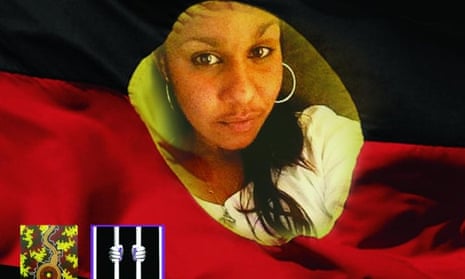The family of an Aboriginal woman who died in custody in Western Australia last year are using the anniversary of her death to call for an immediate end to jailing people for fine defaulting.
Speaking at rallies in Port Hedland, Geraldton and Perth on Tuesday, the family of the 22-year-old Yamatji woman, referred to for cultural reasons as Ms Dhu, called for a detailed public inquest into her death to be brought forward, and for the law to be changed to prevent others being held in custody under the same circumstances.
Dhu was pronounced dead at the hospital in South Hedland, 1,673km north of Perth, on 4 August 2014. It was her third visit to the hospital in the three days since she had been locked up to “pay down” a $1,000 fine.
Western Australia allows people with unpaid fines to clear the debt with jail time, at a rate of $250 a day. It’s a practice Dhu’s family, and the Death in Custody Action Committee, hoped would be outlawed as part of the Barnett government’s promised reforms to the justice system – reforms promised to Dhu’s mother, Della Roe, by the premier, Colin Barnett, on the steps of parliament during a rally last October.
But that doesn’t seem to be the case. In January the corrections minister, Joe Francis, announced he would look at increasing the penalties for people who default on fine payments to prevent people from taking the “soft option” of using jail time to cut out fines.
Francis suggested the government would reverse changes to the law made in 2008, which, among other things, allowed fines to be paid off concurrently.
He also suggested a person’s welfare payment could be garnished to help pay down their fine, a proposal that has received some support from federal Indigenous affairs minister, Nigel Scullion.
“I don’t care if you’re rich or poor, we don’t have a means tested welfare system,” Francis said at the time. “The punishment needs to fit the crime, not your income.”
Dhu’s crime was to get into an altercation with police. The fine she was paying off dated back to an incident four years earlier.
It’s not clear whether she went to the police station voluntarily to pay off her fine, or whether she was picked up. A report in The Australian earlier this year suggested she had been “dobbed in” by a member of the community who knew she and her boyfriend had outstanding warrants against them.
What is known is that she was sporting serious injuries while in lock-up. An interim autopsy report, seen by her family, stated that among other things Dhu was suffering from freshly broken ribs and a number of serious infections.
The injuries are believed to have pre-dated her interaction with police. Her family believes that her boyfriend, who was known to be abusive, could be responsible.
But what is clear from the interim report, according to Marc Newhouse, is that the seriousness of Dhu’s condition should have been obvious the first time that police took her to hospital.
“We have had some medical experts, who wish to remain anonymous at this stage, look at the report,” Newhouse told Guardian Australia. “ They have said that it would have been pretty obvious that this person was not fit to serve time, so if that was the case why was she assessed as being fit to return to jail?”
Newhouse is a spokesman for the Death In Custody Action Watch Committee of WA and went, with Dhu’s mother and grandmother, Della and Carole Roe, to talk to the doctor who was attending when Dhu arrived at the hospital for the third and final time.
She had been bundled in the back seat of a police car; the only ambulance was on the other side of town.
“She had no pulse when she arrived (at hospital), they tried to revive her and that didn’t work,” Newhouse said.
“That means she either died in the cell or on the two minute drive from the police station to the health campus.”
That question will have to be resolved at the public inquest, which is now expected to be held in November. The coroner’s court will meet on Friday to set a date.
Dhu’s family is not the only one awaiting justice. Inquests are yet to be held into the deaths of Maureen Mandijarra, a 44-year-old Aboriginal woman who died in Broome lockup on 30 November 2012, and Jayden Bennell, a 20-year-old Aboriginal man who died on 7 March 2013. There have been three more deaths in custody in WA since Dhu’s death.
Barnett visited the holding cell at South Hedland police station with Della and Carole Roe in April, where, he says, he “made it very clear that I very much regretted if any procedures either within police or the hospital were not up to standard.”
Two months later he announced a package of reforms that he said honoured his promise to Roe, including a 24-hour custody notification service, more investment in early intervention programs targeting young Aboriginal offenders, and introducing legislation to allow police a more flexible approach to dealing with low-level offending.
Newhouse said the proposed reforms were welcome, but meant little while the government was doubling-down on fine defaulting and mandatory sentencing laws.
“It just makes it tokenism to say that we will have this feel-good program, while not actually doing anything about the real causes of the problem,” he said.
“We know that mandatory sentencing and jail for fines unfairly and disproportionately target Aboriginal people, and they should be abolished.”
Newhouse said Della Roe was no closer to coming to terms with her daughter’s death.
“They want answers, they want some changes made, and they want justice,” he said.
